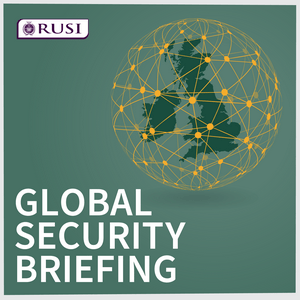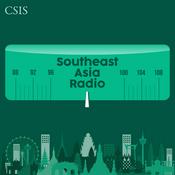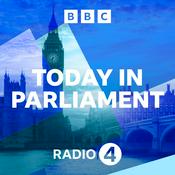116 episodes
- The Greenland crisis has damaged goodwill and trust between the US and Europe and has undermined perceptions of US reliability and trustworthiness.
Following the 2026 World Economic Forum Annual Meeting, should Europe now pursue independence and begin to decouple from the US?
In this bonus episode of Global Security Briefing, we hear from RUSI's Director-General Rachel Ellehuus as she discusses the state of the US-Greenland-Denmark discussions, and the potential lasting impact on the transatlantic relationship and NATO.
Rachel's remarks were recorded during a RUSI webinar on Friday 23 January 2026: https://my.rusi.org/resource-library-search.html?information_type=members-event-recordings
In an hour-long discussion, the panellists, including Rachel Ellehuus, the Director General of RUSI, Oana Lungescu, a RUSI Distinguished Fellow and former long-serving NATO spokesperson and Ed Arnold, Senior Research Fellow for European Security at RUSI, focus on the diplomatic, military and geopolitical fallout from the Greenland crisis for the transatlantic relationship. Become a RUSI member today to access the full recording: https://my.rusi.org/membership.html - As US–European relations face renewed strain under President Trump, this episode explores what the crisis means for NATO, European security and the United Kingdom.
In this episode, Neil Melvin is joined by RUSI Distinguished Fellow Sir David Lidington to discuss the growing crisis in transatlantic relations, from the Greenland dispute and uncertainty over US security commitments to the wider impact of Russia's war in Ukraine and shifting US strategy, and to assess what these changes mean for Europe's security order and the UK's strategic choices.
The discussion explores:
- The resilience of Europe's security order amid transatlantic tension.
- The implications of the Greenland crisis for NATO and European unity.
- How NATO, the EU and smaller groupings are adapting to a harsher security environment.
- The future of the Ukraine war and its impact on European security.
- Whether NATO and the transatlantic relationship can endure.
- How the UK should position itself in a changing Euro-Atlantic landscape.
Recorded on Tuesday 20 January 2026. - Dr Claudia Major joins Neil Melvin to discuss Germany's rearmament drive and its implications for European and transatlantic security.
Germany is undertaking the most significant overhaul of its defence and security policy in decades, moving from long-standing restraint to large-scale rearmament and military reform.
In this episode of Global Security Briefing, Neil Melvin speaks with Dr Claudia Major, Senior Vice President, Transatlantic Security at the German Marshall Fund, about what Germany's changing approach means for Europe's future security.
This episode explores:
- Germany's rearmament strategy, spending priorities and capability timelines.
- The domestic political, public and institutional challenges to sustained defence investment.
- The role of conscription, recruitment and societal defence in Germany's plans.
- How the German defence industry is adapting to unprecedented demand.
- What Germany's emergence as Europe's largest defence actor means for European security.
- How Berlin's rearmament affects relations with European partners, the European Union and the United States.
- Whether Germany's strategic culture is undergoing lasting change. - Dr Burcu Ozcelik and Nicholas Hopton join Neil Melvin to discuss key insights from the Doha Forum and the shifting Middle East security landscape.
In this episode, recorded at the Doha Forum 2025, Neil Melvin speaks with Dr Burcu Ozcelik, Senior Research Fellow at RUSI and Nicholas Hopton, RUSI Distinguished Fellow and former British Ambassador, to discuss the state of Middle Eastern security after two years of conflict. They explore how regional and global powers are responding to the effects of these conflicts, and what a new security order might look like.
Topics discussed include:
The current Middle East landscape following major conflicts across Gaza, Lebanon, Syria and the Gulf.
Prospects for a new regional security order and pathways toward peace.
How regional actors are positioning themselves diplomatically and strategically.
Reactions to the new US National Security Strategy and perceptions of US engagement.
Key takeaways from the Doha Forum debates on regional stability, governance and future diplomacy. - Dr Eric Rudenshiold joins Neil Melvin to examine regional change, great-power competition and Washington's renewed engagement within the Caspian region.
The Caspian region is being reshaped by new political and economic dynamics as Central Asia and the South Caucasus deepen regional cooperation and navigate the competing ambitions of Russia, China and a newly engaged US. President Trump's first presidential-level C5+1 summit marks a notable shift in Washington's approach to a region long viewed as peripheral.
In this episode of Global Security Briefing, Neil Melvin is joined by Dr Eric Rudenshiold, Research Director at the Caspian Policy Center and former NSC Director for Central Asia, to assess how regional actors are adapting to changing power balances and what Washington's renewed focus could mean for future stability and connectivity.
The discussion explores:
Emerging geopolitical and economic trends across the Caspian
Russia's and China's evolving roles and competing integration projects
Growing regional cooperation and expanding Caspian links
The impact of US re-engagement and whether it signals a lasting shift
More Government podcasts
Trending Government podcasts
About Global Security Briefing
Global Security Briefing provides regular insights from leading international experts to help you make sense of the far-reaching changes affecting international security around the globe. Hosted by analysts from RUSI's International Security Studies team, the podcast looks at how the UK can best shape its foreign and security policies in an increasingly dynamic international environment.
The Global Security Briefing channel is also host to a back-catalogue of episodes from the concluded RUSI podcasts 'Bridging the Oceans' and 'Mind the Gulf'.
Running from 2020 to 2023, 'Bridging the Oceans' aimed to create a platform to discuss the key defence and security questions of the world's most dynamic region: the Indo-Pacific. Hosted by Veerle Nouwens, it explored what the Indo-Pacific is, where its limits lie, and what the fast-evolving defence and security issues are in this dynamic part of the world.
Running from January to May 2022, the 'Mind the Gulf' Podcast Series explored how the Iranian nuclear programme – and international diplomatic efforts to prevent Iran from acquiring a nuclear weapon – interacts with regional security dynamics and the wider Middle East.
The views or statements expressed by guests are their own and their appearance on the podcast does not imply an endorsement of them or any entity they represent. Views and opinions expressed by RUSI employees are those of the employees and do not necessarily reflect the view of RUSI.
Podcast websiteListen to Global Security Briefing, Parliament - Live Stream and Question Time and many other podcasts from around the world with the radio.net app

Get the free radio.net app
- Stations and podcasts to bookmark
- Stream via Wi-Fi or Bluetooth
- Supports Carplay & Android Auto
- Many other app features
Get the free radio.net app
- Stations and podcasts to bookmark
- Stream via Wi-Fi or Bluetooth
- Supports Carplay & Android Auto
- Many other app features


Global Security Briefing
Scan code,
download the app,
start listening.
download the app,
start listening.

































